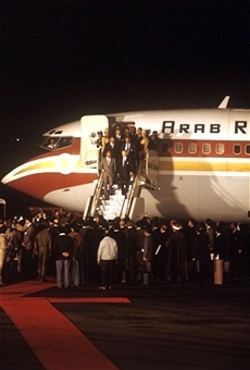Now that prospects appear so good for an Egypt-Israel peace treaty, it is time to take a hard look at the next steps.
 Sadat's arrival in Israel, November 1977. |
Israel needs economic aid for two purposes: to reestablish its Sinai Peninsula military bases in the Negev desert and to ease converting parts of its war economy to more peaceful ends. These goals are specific and short-term. Israel should revive economically and prosper in the foreseeable future.
Aid to Egypt is more complicated. After 30 years of making great sacrifices for war against Israel, the economic hopes of the Egyptian people ride on a peace settlement. They expect it to bring American aid and to bolster its finances by eliminating much of Egypt's military budget. Should their hopes be disappointed, the present government and the peace treaty could both be in jeopardy.
* * *
Several serious problems lie ahead. To begin with, if Saudi Arabia, which currently gives Egypt about $2 billion yearly, cancels future payments, then U.S. assistance will not add revenues but merely replace those funds. Secondly, the massive release of Egyptian soldiers (most of whom are now paid about $5 a month) could well disrupt the Egyptian labor pool and cause social unrest.
 A street scene from the modern part of Cairo in 1973; people want to consume. (Image: Daniel Pipes) |
This endless appetite goes back to the socialist programs which Nasser instituted in 1962. To make them popular, he promised spectacular, infeasible benefits for all Egyptians. These promises came back to haunt Egypt a decade later and now they dominate. Intent on consuming, the Egyptians are not building an economic basis for the future.
Fourth, Egypt spends the little that is not directly consumed on grand and prestigious industrial projects, to the harm of agriculture and small-scale industries. The government encourages high-skilled, capital-intensive industries (such as batteries and refrigerators) despite the lack of infrastructure, adequate skills or capital to sustain them. Private capital, both Egyptian and foreign, avoids these industries so the government has been left to run them.
In the meanwhile, Egypt's true assets, its extraordinarily fertile land and its inexpensive semi-skilled labor, have been ignored. The Nile Valley is one of the world's most splendid farming areas; Egypt should (like Lebanon, Israel and Morocco) take advantage of its climate and proximity to Europe to grow specialty items for the European market, such as winter fruits and cut flowers. Instead, the government neglects the land; notwithstanding its touted land reclamation projects, Egypt has lost over 10% of its precious cultivable land to creeping urbanization in recent years. Labor-intensive, small-scale industries producing simple necessities such as textiles and food products for a local market should be encouraged to spread throughout the countryside, as in Mexico.
* * *
As a result of these problems, the Egyptian economy is, in full view of 40 million citizens going steadily downhill. The bulk of the population finds it hard to maintain already low living standards.
The city of Cairo symbolizes this problem. Its infrastructure was built at the turn of this century to accommodate less than a million inhabitants. The city now houses an astonishing eight million or more. Some parts of Cairo containing two-and-three floor houses equal the population density of high-rise Manhattan; services are so poor that many businesses have given up on the telephone and reverted to fleets of messenger boys; electricity fails nightly in some quarters; the infrequent rains turn the streets into oily lakes; and buildings collapse every month.
Picture the Egyptian economy as one of those old, rickety Cairene buildings nearing collapse. What can U.S. aid do for it? The danger is, the Egyptian government seeks a new roof; while this will temporarily keep the inhabitants out of the rain and sun, it does nothing to save them from total collapse – indeed, the additional weight on top only worsens that prospect. While recognizing the political need to spend some funds on consumer needs, the U.S. must insist that most of its aid go to building foundations for a new structure. Future social and political stability requires major economic innovations. Large-scale industry and urban consumers must be passed by in favor of agriculture and the countryside, the past and future source of Egyptian wealth.
The United States must give Egypt aid to keep it upright; we must also carefully direct its use to build new foundations.
Mr. Pipes, William Rainey Harper Fellow at the University of Chicago, lived in Cairo in 1976 and 1977.